专题01 Units 1~4 单词,短语,重点句式课件【期中考点大通关】2024-2025学年九年级英语上学期(沪教牛津版)
文档属性
| 名称 | 专题01 Units 1~4 单词,短语,重点句式课件【期中考点大通关】2024-2025学年九年级英语上学期(沪教牛津版) |
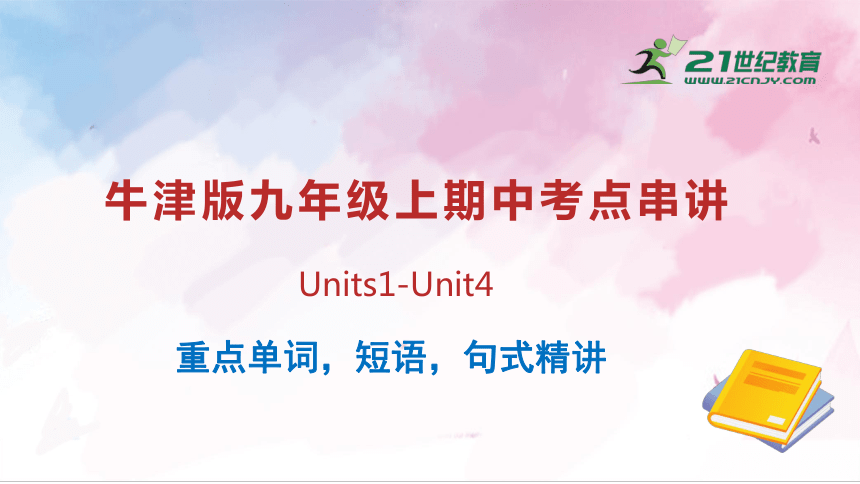
|
|
| 格式 | pptx | ||
| 文件大小 | 1.9MB | ||
| 资源类型 | 试卷 | ||
| 版本资源 | 牛津深圳版 | ||
| 科目 | 英语 | ||
| 更新时间 | 2024-10-23 14:36:53 | ||
图片预览

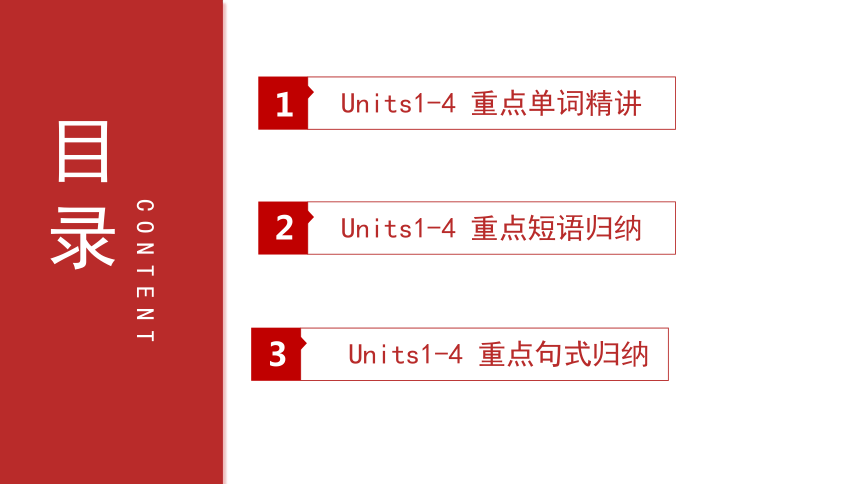
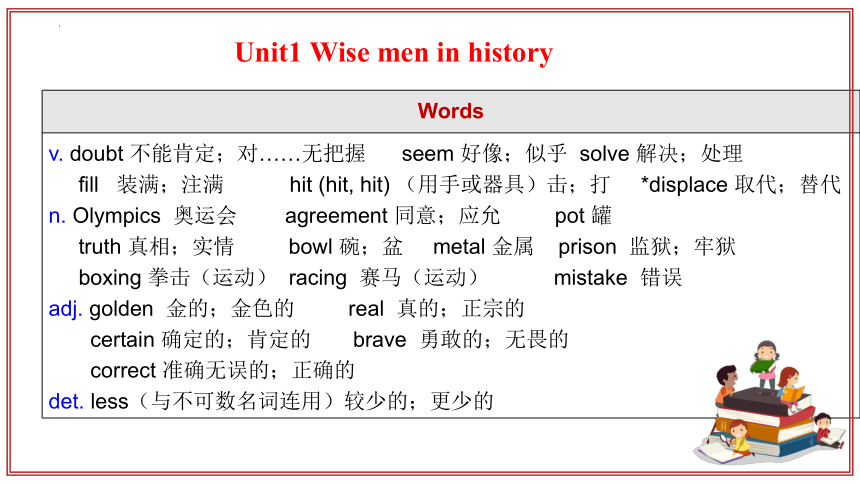
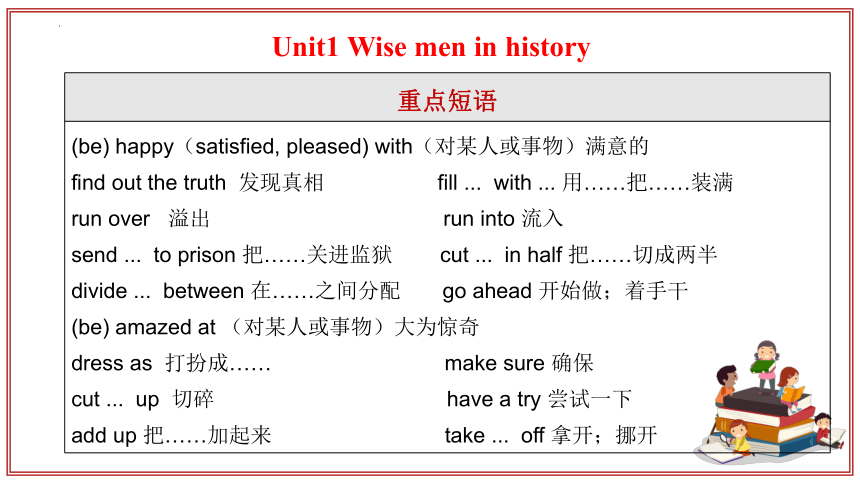
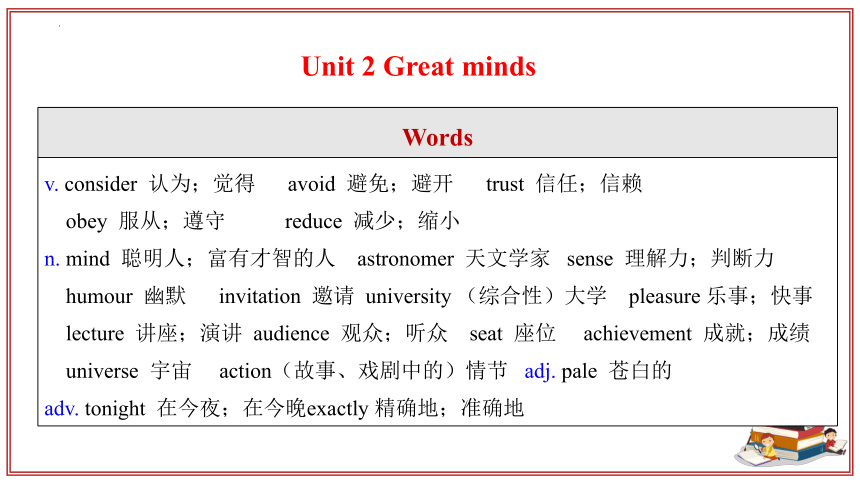
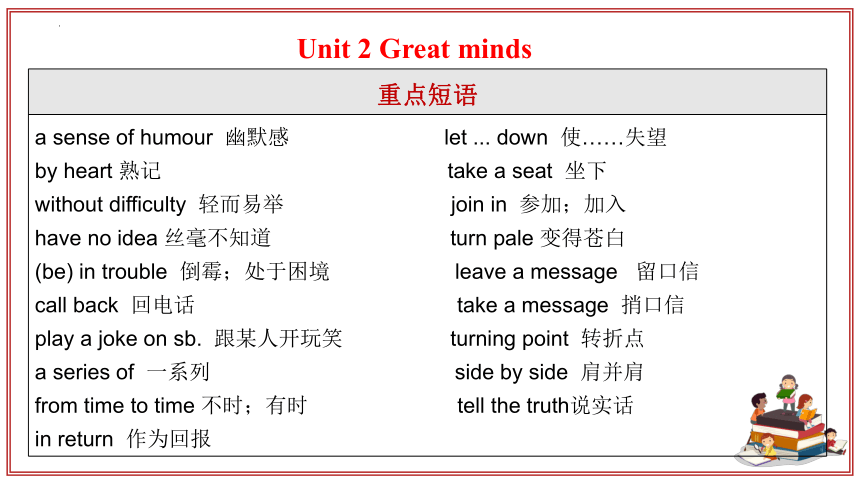
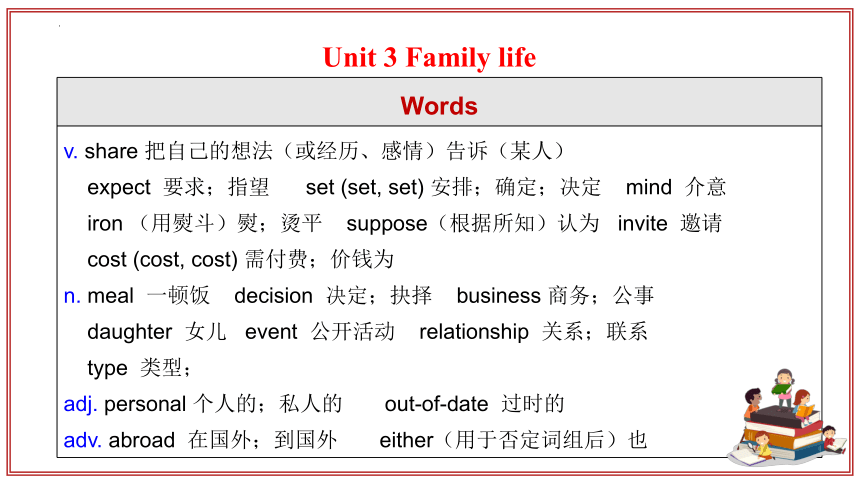
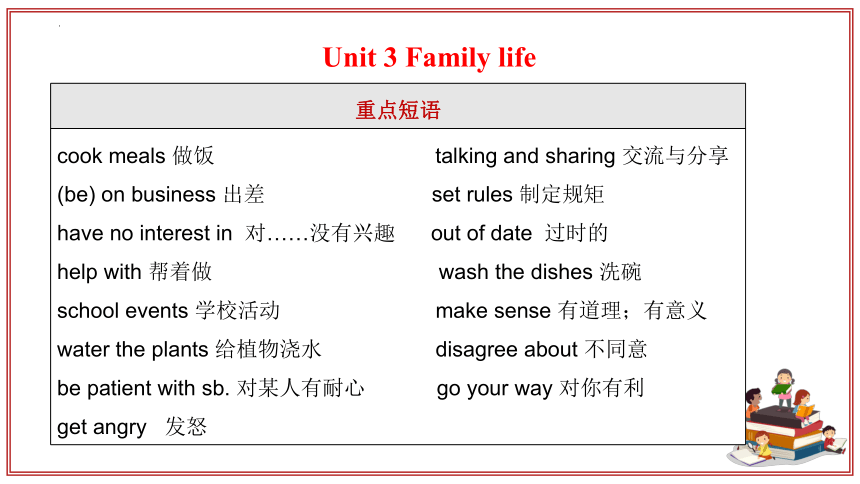
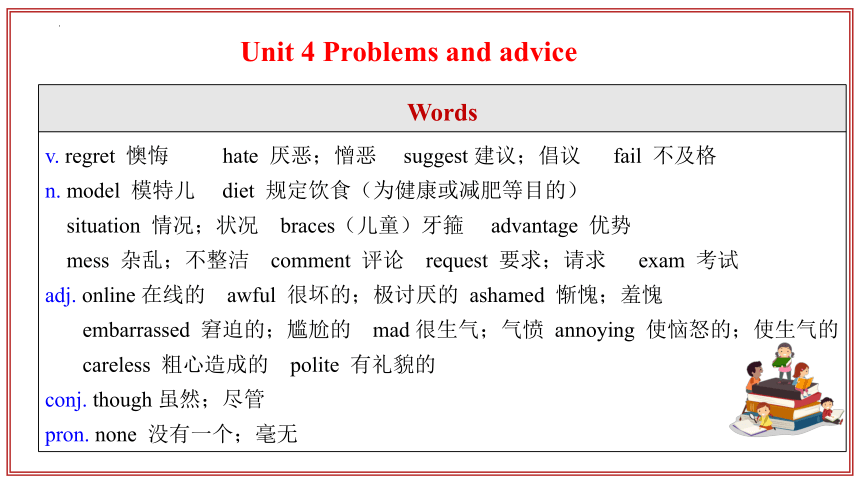
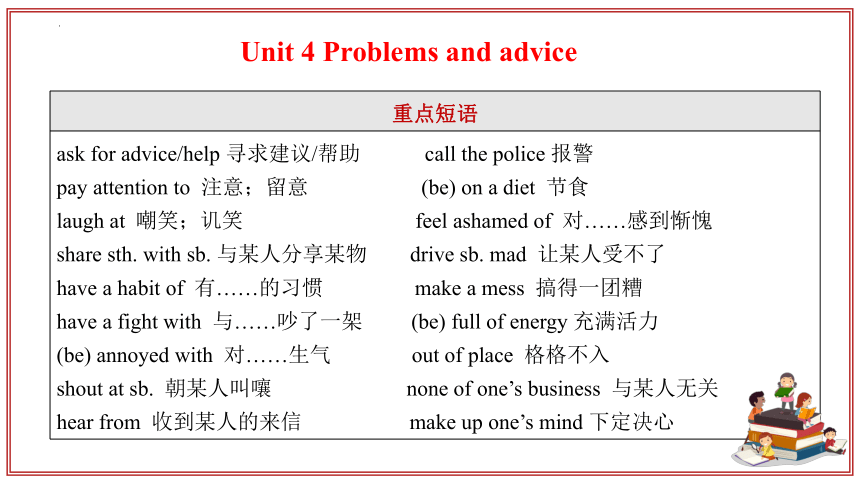
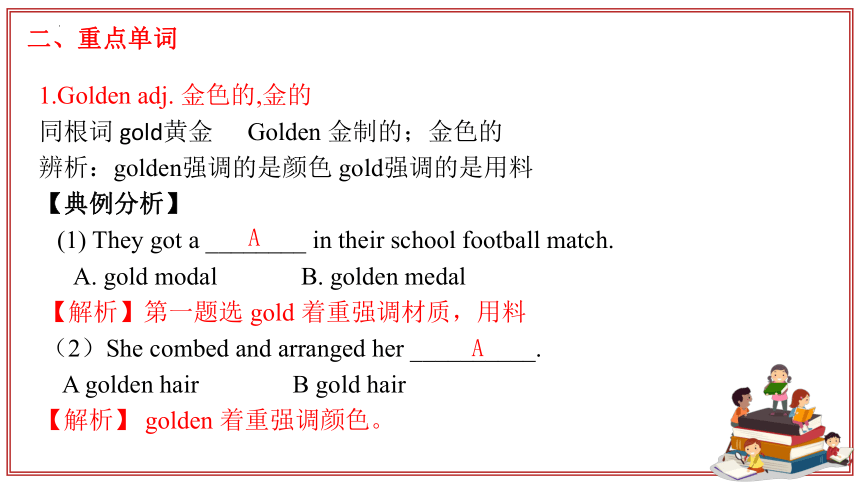
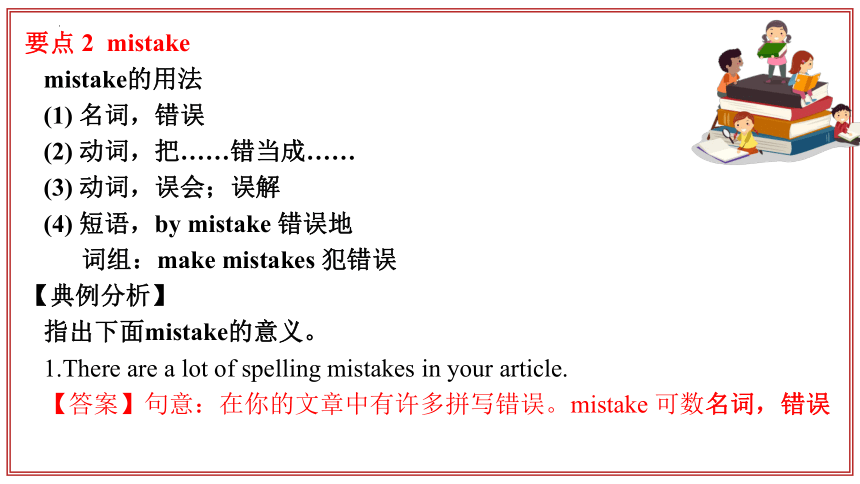
文档简介
(共39张PPT)
牛津版九年级上期中考点串讲
Units1-Unit4
重点单词,短语,句式精讲
目
录
CONTENT
Units1-4 重点单词精讲
Units1-4 重点短语归纳
Units1-4 重点句式归纳
2
3
1
Words
v. doubt 不能肯定;对……无把握 seem 好像;似乎 solve 解决;处理
fill 装满;注满 hit (hit, hit) (用手或器具)击;打 *displace 取代;替代
n. Olympics 奥运会 agreement 同意;应允 pot 罐
truth 真相;实情 bowl 碗;盆 metal 金属 prison 监狱;牢狱
boxing 拳击(运动) racing 赛马(运动) mistake 错误
adj. golden 金的;金色的 real 真的;正宗的
certain 确定的;肯定的 brave 勇敢的;无畏的
correct 准确无误的;正确的
det. less(与不可数名词连用)较少的;更少的
Unit1 Wise men in history
Unit1 Wise men in history
重点短语
(be) happy(satisfied, pleased) with(对某人或事物)满意的
find out the truth 发现真相 fill ... with ... 用……把……装满
run over 溢出 run into 流入
send ... to prison 把……关进监狱 cut ... in half 把……切成两半
divide ... between 在……之间分配 go ahead 开始做;着手干
(be) amazed at (对某人或事物)大为惊奇
dress as 打扮成…… make sure 确保
cut ... up 切碎 have a try 尝试一下
add up 把……加起来 take ... off 拿开;挪开
Unit 2 Great minds
Words
v. consider 认为;觉得 avoid 避免;避开 trust 信任;信赖
obey 服从;遵守 reduce 减少;缩小
n. mind 聪明人;富有才智的人 astronomer 天文学家 sense 理解力;判断力
humour 幽默 invitation 邀请 university (综合性)大学 pleasure 乐事;快事
lecture 讲座;演讲 audience 观众;听众 seat 座位 achievement 成就;成绩
universe 宇宙 action(故事、戏剧中的)情节 adj. pale 苍白的
adv. tonight 在今夜;在今晚exactly 精确地;准确地
Unit 2 Great minds
重点短语
a sense of humour 幽默感 let ... down 使……失望
by heart 熟记 take a seat 坐下
without difficulty 轻而易举 join in 参加;加入
have no idea 丝毫不知道 turn pale 变得苍白
(be) in trouble 倒霉;处于困境 leave a message 留口信
call back 回电话 take a message 捎口信
play a joke on sb. 跟某人开玩笑 turning point 转折点
a series of 一系列 side by side 肩并肩
from time to time 不时;有时 tell the truth说实话
in return 作为回报
Words
v. share 把自己的想法(或经历、感情)告诉(某人)
expect 要求;指望 set (set, set) 安排;确定;决定 mind 介意
iron (用熨斗)熨;烫平 suppose(根据所知)认为 invite 邀请
cost (cost, cost) 需付费;价钱为
n. meal 一顿饭 decision 决定;抉择 business 商务;公事
daughter 女儿 event 公开活动 relationship 关系;联系
type 类型;
adj. personal 个人的;私人的 out-of-date 过时的
adv. abroad 在国外;到国外 either(用于否定词组后)也
Unit 3 Family life
Unit 3 Family life
重点短语
cook meals 做饭 talking and sharing 交流与分享
(be) on business 出差 set rules 制定规矩
have no interest in 对……没有兴趣 out of date 过时的
help with 帮着做 wash the dishes 洗碗
school events 学校活动 make sense 有道理;有意义
water the plants 给植物浇水 disagree about 不同意
be patient with sb. 对某人有耐心 go your way 对你有利
get angry 发怒
Words
v. regret 懊悔 hate 厌恶;憎恶 suggest 建议;倡议 fail 不及格
n. model 模特儿 diet 规定饮食(为健康或减肥等目的)
situation 情况;状况 braces(儿童)牙箍 advantage 优势
mess 杂乱;不整洁 comment 评论 request 要求;请求 exam 考试
adj. online 在线的 awful 很坏的;极讨厌的 ashamed 惭愧;羞愧
embarrassed 窘迫的;尴尬的 mad 很生气;气愤 annoying 使恼怒的;使生气的
careless 粗心造成的 polite 有礼貌的
conj. though 虽然;尽管
pron. none 没有一个;毫无
Unit 4 Problems and advice
重点短语
ask for advice/help 寻求建议/帮助 call the police 报警
pay attention to 注意;留意 (be) on a diet 节食
laugh at 嘲笑;讥笑 feel ashamed of 对……感到惭愧
share sth. with sb. 与某人分享某物 drive sb. mad 让某人受不了
have a habit of 有……的习惯 make a mess 搞得一团糟
have a fight with 与……吵了一架 (be) full of energy 充满活力
(be) annoyed with 对……生气 out of place 格格不入
shout at sb. 朝某人叫嚷 none of one’s business 与某人无关
hear from 收到某人的来信 make up one’s mind 下定决心
Unit 4 Problems and advice
二、重点单词
1.Golden adj. 金色的,金的
同根词 gold黄金 Golden 金制的;金色的
辨析:golden强调的是颜色 gold强调的是用料
【典例分析】
(1) They got a ________ in their school football match.
A. gold modal B. golden medal
【解析】第一题选 gold 着重强调材质,用料
(2)She combed and arranged her __________.
A golden hair B gold hair
【解析】 golden 着重强调颜色。
A
A
要点 2 mistake
mistake的用法
(1) 名词,错误
(2) 动词,把……错当成……
(3) 动词,误会;误解
(4) 短语,by mistake 错误地
词组:make mistakes 犯错误
【典例分析】
指出下面mistake的意义。
1.There are a lot of spelling mistakes in your article.
【答案】句意:在你的文章中有许多拼写错误。mistake 可数名词,错误
2.He was mistaken for the minister.
【答案】句意:他被错当成牧师了。 mistake for动词,把……错当成……
3.You mistook my meaning entirely.
【答案】句意:你完全误解了我的意思。mistake动词,误会;误解。
4.I took your bag by mistake.
【答案】句意:我错拿了你的包。短语,by mistake 错误地
seem常作系动词,意为“看来;似乎”,其常见结构如下:
1.seem+形容词/名词,意为“似乎……”。例如:
She seems quite happy today.今天她似乎很高兴。
She seems a clever girl.看来她是一个聪明的女孩。
2.seem+to do sth.,意为“好像要做某事”。例如:
Something seemed to be wrong with the train.火车好像出故障了。
3.It seems/seemed+ that从句,意为“看起来似乎……”。
4.seem like...意为“似乎是……;看起来像……”。例如:
It seems like an interesting film.它看起来像是一部有趣的电影。
要点 3 seem
【典例分析】
1.它看起来像是一部有趣的电影。
It __________ ___________an interesting film.
2.他似乎已经找到他的钱包了。
______ _____ ____he has found his wallet.
3.she seems unhappy. (改为同义句)
=She _____ ____ _____ unhappy.
=_______ _______ ______she is unhappy
seems like
It seems that
seems to be
It seems that
要点4 avoid
avoid v. 避免;防止
We should avoid making any noise in the background!
我们应该避免背景中出现任何杂音!
avoid的常见用法如下:
(1)avoid doing sth.避免做某事
(2)avoid sb./sth.躲避某人/某物
【拓展】 类似的后接动名词的常见搭配:
enjoy doing sth. 喜欢做某事 finish doing sth. 做完某事
practise doing sth. 练习做某事 mind doing sth. 介意做某事 miss doing sth. 错过做某事
【口诀】 巧记后接v. ing形式的动词口诀:
喜欢(enjoy)按照建议(suggest)一直(keep)练习(practise),直到完成(finish),避免(avoid)错过(miss)任何内容引起老师介意(mind)。
要点5 achieve
achieve意为“实现;达到;获得”时,一般只用作及物动词,通常以目标、目的、胜利、地位等作宾语,指排除各种困难、障碍而完成宏伟的目标或赢得胜利,如achieve a goal“实现目标”,achieve a dream“实现梦想”,achieve success“获得成功”。其同义短语为不及物动词短语come true,意为“实现”,一般由物(理想、愿望等) 作主语。例如:
My dream has come true.我的理想已经实现了。
2.achieve的名词形式为achievement,意为“成就;业绩;实现;达到”。例如:
We felt a great sense of achievement when we reached the top of the mountain.
当到达山顶时,我们感到很有成就感。
achieve 表示 “实现”, 其主语通常是人
come true 表示 “实现”, 其主语通常是梦想等
辨析achieve与come true
1. If we Chinese work hard together, China Dream will ________.
A. come out B. come true C. achieve D. come on
【答案】B 句意:如果我们中国人一起努力,中国梦就会实现。Come true实现,成为现实。主语一般指“计划”“梦想,希望”等。Achieve one’s dream 实现梦想。主语一般指人。故答案选B
2.恐怕他的愿望很难实现。
I’m afraid his wish won’t _______ _______easily.
I’m afraid he won’t ________ _______ ______easily.
3. Even a small success can give you a sense of _________ (achieve) .
come true
achieve his dream
achievement
要点6 doubt
doubt用作名词,意为“疑惑,疑问”。常用短语:without doubt意为“毫无疑问;的确”;no doubt意为“无疑;确实地”.
A sudden doubt came to my mind.
He is without doubt the cleverest student I have ever taught.
拓展
doubt还可用作动词,意为“怀疑”。后可接名词、代词、if/whether/ that从句等做宾语。
典例 He doubted Jim, since he was ever dishonest.
There is no room for doubt.(名词)没有怀疑的余地。
I had no reason to doubt him.(动词)我没有理由怀疑他。
名言 Doubt is the key to knowledge.怀疑是知识的钥匙。
要点7 expect
expect的用法
作为动词,意为“期盼;等待”。常用于以下表达中:
(1) expect to do sth.意为“期望做某事”
You can’t expect to learn English in a few months. 你不要指望几个月的时间能够把英语学好。
(2)expect sb. to do sth. 意为“希望某人做某事”
I expect my mother to buy me a bike. 我希望我妈妈给我买一辆自行车。
(3)expect + that 从句, 意为“预料……”
I don’t expect that Tom has done such a thing. 我预料汤姆不会做出这种事来的。
要点 8
win为动词,意为“赢、获胜”,
例:We are sure to win the game.我们确信能赢得比赛。
【考点】辨析win和beat
① win指在游戏、比赛、竞赛、选举中获胜,后常跟game, race, prize等表示“物”的词。
例:Tom won first prize in the writing competition.汤姆在写作竞赛中赢得了一等奖
② beat指在运动、比赛等中获胜,打败了其他人或其他队,后常跟somebody, class等表示“人”的词。
例:They beat us in the basketball match last Monday. 上周一他们在篮球比赛中打败我们。
【典例分析】
1.在最后,我们获得了比赛胜利!
At last,we ________ the game!
2.他竭尽全力击败他的朋友并获得了比赛的胜利
He tried his best to_________ his friend and __________ the game!
3.Xu Haifeng ________ the first gold ________ in Olympic Games for China.
won
beat won
要点9 lonely
lonely表示“寂寞的,孤寂的”,带有较强感彩,可用作表语或定语;表示“荒凉的,偏僻的”,用来说明地方,多用作定语。例如:
When his wife died, he was very lonely. 太太死后他非常孤独。
【拓展】lonely与alone的辨析:
lonely作形容词,意为“(人)孤单的,寂寞的”,它更强调一种主观的感觉;alone作形容词和副词,意为“独自的(地),单独的(地)”,它更强调一种客观情况。alone作形容词,在句中只用作表语。例如:
Don’t leave me alone. I will feel lonely.
别留下我一个人,我会觉得孤单的。
【典例分析】
1.The old man lives in a __________place _________. He feels ________ because he doesn’t have any sons or daughters.(用alone,lonely填空)
【点拨】第一空lonely “偏僻的”,只作定语。 第二空,alone 强调客观上“独自一人”,第三空,lonely强调情感上“孤独的;寂寞的”
2. His grandparents live ______ in a small house, but they don't feel _____.
A. lonely; alone B. alone; lonely C. lonely; lonely D. alone; alone
【点拨】B句意:他的祖父母独自住在一个小房子里,但他们并不感到孤独。考查形容词与副词。alone可以作形容词,也可以作副词,意为“单独,独自”;而lonely只可以作形容词,意为"内心孤独的"。根据句中关键词live可知,要用副词alone来修饰;关键词feel是一个感官系动词,后面应跟形容词lonely。故选B。
要点10
hear sb./sth.+动词原形:听见某人/某物(经常/过去)做…….
hear sb./sth.+动词-ing: 听见某人/某物正在做…….
I heard her play the piano in her room last night.
I hear her playing the piano in her room now.
hear sb. doing sth. 听到某人正在做某事
【考点聚焦】
1)注意区别hear sb. do和hear sb. doing:
hear sb. do sth.表示“听到某人做某事的全过程”。
hear sb. doing sth.表示“听到某人正在做某事”。
现在分词短语作宾语补足语。
2)注意掌握hear的其他短语:
hear about听说关于…… hear of听说……
hear that ...听说…… hear from收到……的来信
还有see 和watch 还有类似用法
【典例分析】
1.—Is Tom in the next room
—Well, it's hard to say. But I heard him __ loudly when I passed by just now.
speak B. to speak C. spoken D. speaking
【答案】D
【解析】由 when I passed by just now 可知,是强调动作正在进行,hear sb. doing sth. 听见某人正在做某事,
要点11 suppose
(1)动词suppose意为“猜想、假设”,suppose后接that从句,that可以省略。例如:
I suppose he is not yet twenty. 我猜想他不到二十岁。
(2)be supposed to后面用动词原形,表示“被期望做某事、应该做某事”,相当于情态动词should。例如:
You are supposed to say hello to the foreigners. 你应该跟这些外宾打招呼。
【拓展】
(1)当句子的主语是人的时候,be supposed to表示“应该做某事、被期望做某事”,经常用来表示劝告、建议、义务和责任等。这里be supposed to相当于情态动词should。例如:
You are supposed to ask our teacher if you want to leave the classroom.
如果你要离开教室,应该先问一问我们的老师。
(2)当句子的主语是物的时候,be supposed to表示“本应该”的意思,经常用来表示某事物本应该发生而没有发生。例如:
The meeting was supposed to take place on Tuesday, but we have to put it off.
这个会议本应该在星期二举行,但我们不得不把他推迟了。
【典例分析】
1.As a student, you________ do your homework by yourself.
A.suppose that B.are supposed to
C.are supposed D.are wanted
【答案】B be supposed to do 应该做某事。
2.我猜想我们下周将去那儿.
I suppose _____ _____ ____ ____next week.
they will go there
要点12 regret
regret动词,意为“懊悔;遗憾” 。
regret (doing) sth.“对某事感到后悔(已经做过的)”
regret to do sth.“为要做的事感到抱歉、遗憾(马上要做)。
I don't regret telling her what I thought.
I regret causing him so much inconvenience.
我因让他如此不方便而感到后悔。
【典例分析】
1.李先生后悔给妻子买了这么贵的包。
Mr. Li regretted__________ such an expensive bag for his wife.
2.我遗憾地告诉你,你考试不及格。
I regret ______________you failed in the exam.
buying
to tell
要点13 worry
(1)worry可用作不及物动词或及物动词。作及物动词时,意为“使烦恼,使担忧”。作不及物动词时,意为“发愁,担心,烦恼”,常与介词about连用。例如:
What’s worrying you 什么事使你烦恼?
Don’t worry about me. 不要为我担心。
(2)worry也可用作名词。既可作可数名词,也可作不可数名词。例如:
Her face showed signs of worry. 她脸上显出担忧的神情。
I have a lot of worries. 我有很多担心。
(
3)worry的过去分词worried相当于形容词,意为“担心的,烦恼的”,常与be/look/feel等系动词连用。be worried about意为“为……担心”。例如:
She is worried about her sick mother. 她担心她生病的母亲。
worry about 担心,担忧
be worried about . . . 结构中,意为“担心…”,表示状态,一般不用于祈使句中。
要点14
smell n.气味 v.发出…气味;闻到
典例 Bob and Sally hate the smell of onions.(名词)鲍勃和萨莉讨厌洋葱的气味。
Dinner smells good.(动词)晚饭闻起来很香。
The dog smelt a rabbit.(动词)狗嗅到了兔子的气味
一句辨义 The boy smelt the bottle, and there was a strange smell.
这个男孩闻了闻这个瓶子,有一种奇怪的气味。
注意 smell的过去式为 smelled或 smelt;过去分词为 smelled或 smelt。
拓展:smell作系动词,意为“闻到……的味道, 闻起来”,后接形容词作表语。
类似的还有:
taste 尝起来……
look.....看起来
sound......听起来 + adj
smell.....闻起来
feel.....摸起来,感觉
1.Coffee is ready. How nice it___!
A.smells B.sounds C.feels D. becomes
【答案】A
【解析】句意:咖啡准备好了,它闻起来多好!A. smells闻起来;B. sounds听起来; C. feels摸起来; D. becomes成为。根据形容词nice,可知动词应该是系动词;根据前面提到的是咖啡,所以应该是闻起来。故选A。
1.It’s a nice crown, isn’t it
2.Later, however, he began to doubt that it was a real golden crown.
3.This problem seems difficult to solve.
4.Archimedes was still thinking about this problem as he filled his bath with water.
5.A crown made completely of gold displaces less water than a crown made of gold and another metal.
6.The crown maker tricked me, didn’t he What a bad man he is!
7.Everyone was amazed at how King Solomon solved this problem.
8.I want to be a scientist like him in the future.
9.I’ll think of a way.
10.Cao Chong drew a line on the side of the boat to mark how low it went.
Unit 1 Useful sentences
Unit 2 Useful sentences
1.Many people consider Albert Einstein (1897—1955) a genius.
2.It’s a pleasure to drive a genius like you, Dr Einstein.
3.I wish I could avoid giving my lecture tonight.
4.I’ve listened to your lecture so many times that I’ve learnt it by heart.
5.He then asked a question so difficult that Hans had no idea what he was talking about.
6.Can I leave a message
7.Can you ask ... to call me back
8.He enjoyed playing harmless jokes on people.
9.But you’re wearing your sweater backwards, ...
10.You’re the first person to be so honest with me.
Unit 3 Useful sentences
1.They don’t usually set rules for me, and since I’m a good daughter, they never punish me.
2.Although it sometimes feels crowded in our little flat, we don’t mind.
3.New fashions soon go out of date, don’t they
4.We have a close relationship, and we always support each other.
5.This idea seems to make sense.
6.Can I give you a hand
7.Thanks very much, but I can manage.
8.It is no good for you to require everything to go your way.
9.You have to be ready to change a little if you want them to change.
10.How can you expect them to listen to you if you are not ready to listen to them
Unit 4 Useful sentences
1.It was awful of them to laugh at her, and I regret not saying anything.
2.What should I do in this situation
3.I don’t see any advantage in ...
4.She has a habit of playing the piano when I’m studying.
5.Why don’t you ...
6.I believe you’ve learnt an important lesson.
7..., but think of the beautiful, straight teeth you’ll have in a few months’ time!
8.Ask her to play the piano only when you’re not studying.
9.Let her borrow your things only if she asks you first.
10.Perhaps she just wants more attention from you.
牛津版九年级上期中考点串讲
Units1-Unit4
重点单词,短语,句式精讲
目
录
CONTENT
Units1-4 重点单词精讲
Units1-4 重点短语归纳
Units1-4 重点句式归纳
2
3
1
Words
v. doubt 不能肯定;对……无把握 seem 好像;似乎 solve 解决;处理
fill 装满;注满 hit (hit, hit) (用手或器具)击;打 *displace 取代;替代
n. Olympics 奥运会 agreement 同意;应允 pot 罐
truth 真相;实情 bowl 碗;盆 metal 金属 prison 监狱;牢狱
boxing 拳击(运动) racing 赛马(运动) mistake 错误
adj. golden 金的;金色的 real 真的;正宗的
certain 确定的;肯定的 brave 勇敢的;无畏的
correct 准确无误的;正确的
det. less(与不可数名词连用)较少的;更少的
Unit1 Wise men in history
Unit1 Wise men in history
重点短语
(be) happy(satisfied, pleased) with(对某人或事物)满意的
find out the truth 发现真相 fill ... with ... 用……把……装满
run over 溢出 run into 流入
send ... to prison 把……关进监狱 cut ... in half 把……切成两半
divide ... between 在……之间分配 go ahead 开始做;着手干
(be) amazed at (对某人或事物)大为惊奇
dress as 打扮成…… make sure 确保
cut ... up 切碎 have a try 尝试一下
add up 把……加起来 take ... off 拿开;挪开
Unit 2 Great minds
Words
v. consider 认为;觉得 avoid 避免;避开 trust 信任;信赖
obey 服从;遵守 reduce 减少;缩小
n. mind 聪明人;富有才智的人 astronomer 天文学家 sense 理解力;判断力
humour 幽默 invitation 邀请 university (综合性)大学 pleasure 乐事;快事
lecture 讲座;演讲 audience 观众;听众 seat 座位 achievement 成就;成绩
universe 宇宙 action(故事、戏剧中的)情节 adj. pale 苍白的
adv. tonight 在今夜;在今晚exactly 精确地;准确地
Unit 2 Great minds
重点短语
a sense of humour 幽默感 let ... down 使……失望
by heart 熟记 take a seat 坐下
without difficulty 轻而易举 join in 参加;加入
have no idea 丝毫不知道 turn pale 变得苍白
(be) in trouble 倒霉;处于困境 leave a message 留口信
call back 回电话 take a message 捎口信
play a joke on sb. 跟某人开玩笑 turning point 转折点
a series of 一系列 side by side 肩并肩
from time to time 不时;有时 tell the truth说实话
in return 作为回报
Words
v. share 把自己的想法(或经历、感情)告诉(某人)
expect 要求;指望 set (set, set) 安排;确定;决定 mind 介意
iron (用熨斗)熨;烫平 suppose(根据所知)认为 invite 邀请
cost (cost, cost) 需付费;价钱为
n. meal 一顿饭 decision 决定;抉择 business 商务;公事
daughter 女儿 event 公开活动 relationship 关系;联系
type 类型;
adj. personal 个人的;私人的 out-of-date 过时的
adv. abroad 在国外;到国外 either(用于否定词组后)也
Unit 3 Family life
Unit 3 Family life
重点短语
cook meals 做饭 talking and sharing 交流与分享
(be) on business 出差 set rules 制定规矩
have no interest in 对……没有兴趣 out of date 过时的
help with 帮着做 wash the dishes 洗碗
school events 学校活动 make sense 有道理;有意义
water the plants 给植物浇水 disagree about 不同意
be patient with sb. 对某人有耐心 go your way 对你有利
get angry 发怒
Words
v. regret 懊悔 hate 厌恶;憎恶 suggest 建议;倡议 fail 不及格
n. model 模特儿 diet 规定饮食(为健康或减肥等目的)
situation 情况;状况 braces(儿童)牙箍 advantage 优势
mess 杂乱;不整洁 comment 评论 request 要求;请求 exam 考试
adj. online 在线的 awful 很坏的;极讨厌的 ashamed 惭愧;羞愧
embarrassed 窘迫的;尴尬的 mad 很生气;气愤 annoying 使恼怒的;使生气的
careless 粗心造成的 polite 有礼貌的
conj. though 虽然;尽管
pron. none 没有一个;毫无
Unit 4 Problems and advice
重点短语
ask for advice/help 寻求建议/帮助 call the police 报警
pay attention to 注意;留意 (be) on a diet 节食
laugh at 嘲笑;讥笑 feel ashamed of 对……感到惭愧
share sth. with sb. 与某人分享某物 drive sb. mad 让某人受不了
have a habit of 有……的习惯 make a mess 搞得一团糟
have a fight with 与……吵了一架 (be) full of energy 充满活力
(be) annoyed with 对……生气 out of place 格格不入
shout at sb. 朝某人叫嚷 none of one’s business 与某人无关
hear from 收到某人的来信 make up one’s mind 下定决心
Unit 4 Problems and advice
二、重点单词
1.Golden adj. 金色的,金的
同根词 gold黄金 Golden 金制的;金色的
辨析:golden强调的是颜色 gold强调的是用料
【典例分析】
(1) They got a ________ in their school football match.
A. gold modal B. golden medal
【解析】第一题选 gold 着重强调材质,用料
(2)She combed and arranged her __________.
A golden hair B gold hair
【解析】 golden 着重强调颜色。
A
A
要点 2 mistake
mistake的用法
(1) 名词,错误
(2) 动词,把……错当成……
(3) 动词,误会;误解
(4) 短语,by mistake 错误地
词组:make mistakes 犯错误
【典例分析】
指出下面mistake的意义。
1.There are a lot of spelling mistakes in your article.
【答案】句意:在你的文章中有许多拼写错误。mistake 可数名词,错误
2.He was mistaken for the minister.
【答案】句意:他被错当成牧师了。 mistake for动词,把……错当成……
3.You mistook my meaning entirely.
【答案】句意:你完全误解了我的意思。mistake动词,误会;误解。
4.I took your bag by mistake.
【答案】句意:我错拿了你的包。短语,by mistake 错误地
seem常作系动词,意为“看来;似乎”,其常见结构如下:
1.seem+形容词/名词,意为“似乎……”。例如:
She seems quite happy today.今天她似乎很高兴。
She seems a clever girl.看来她是一个聪明的女孩。
2.seem+to do sth.,意为“好像要做某事”。例如:
Something seemed to be wrong with the train.火车好像出故障了。
3.It seems/seemed+ that从句,意为“看起来似乎……”。
4.seem like...意为“似乎是……;看起来像……”。例如:
It seems like an interesting film.它看起来像是一部有趣的电影。
要点 3 seem
【典例分析】
1.它看起来像是一部有趣的电影。
It __________ ___________an interesting film.
2.他似乎已经找到他的钱包了。
______ _____ ____he has found his wallet.
3.she seems unhappy. (改为同义句)
=She _____ ____ _____ unhappy.
=_______ _______ ______she is unhappy
seems like
It seems that
seems to be
It seems that
要点4 avoid
avoid v. 避免;防止
We should avoid making any noise in the background!
我们应该避免背景中出现任何杂音!
avoid的常见用法如下:
(1)avoid doing sth.避免做某事
(2)avoid sb./sth.躲避某人/某物
【拓展】 类似的后接动名词的常见搭配:
enjoy doing sth. 喜欢做某事 finish doing sth. 做完某事
practise doing sth. 练习做某事 mind doing sth. 介意做某事 miss doing sth. 错过做某事
【口诀】 巧记后接v. ing形式的动词口诀:
喜欢(enjoy)按照建议(suggest)一直(keep)练习(practise),直到完成(finish),避免(avoid)错过(miss)任何内容引起老师介意(mind)。
要点5 achieve
achieve意为“实现;达到;获得”时,一般只用作及物动词,通常以目标、目的、胜利、地位等作宾语,指排除各种困难、障碍而完成宏伟的目标或赢得胜利,如achieve a goal“实现目标”,achieve a dream“实现梦想”,achieve success“获得成功”。其同义短语为不及物动词短语come true,意为“实现”,一般由物(理想、愿望等) 作主语。例如:
My dream has come true.我的理想已经实现了。
2.achieve的名词形式为achievement,意为“成就;业绩;实现;达到”。例如:
We felt a great sense of achievement when we reached the top of the mountain.
当到达山顶时,我们感到很有成就感。
achieve 表示 “实现”, 其主语通常是人
come true 表示 “实现”, 其主语通常是梦想等
辨析achieve与come true
1. If we Chinese work hard together, China Dream will ________.
A. come out B. come true C. achieve D. come on
【答案】B 句意:如果我们中国人一起努力,中国梦就会实现。Come true实现,成为现实。主语一般指“计划”“梦想,希望”等。Achieve one’s dream 实现梦想。主语一般指人。故答案选B
2.恐怕他的愿望很难实现。
I’m afraid his wish won’t _______ _______easily.
I’m afraid he won’t ________ _______ ______easily.
3. Even a small success can give you a sense of _________ (achieve) .
come true
achieve his dream
achievement
要点6 doubt
doubt用作名词,意为“疑惑,疑问”。常用短语:without doubt意为“毫无疑问;的确”;no doubt意为“无疑;确实地”.
A sudden doubt came to my mind.
He is without doubt the cleverest student I have ever taught.
拓展
doubt还可用作动词,意为“怀疑”。后可接名词、代词、if/whether/ that从句等做宾语。
典例 He doubted Jim, since he was ever dishonest.
There is no room for doubt.(名词)没有怀疑的余地。
I had no reason to doubt him.(动词)我没有理由怀疑他。
名言 Doubt is the key to knowledge.怀疑是知识的钥匙。
要点7 expect
expect的用法
作为动词,意为“期盼;等待”。常用于以下表达中:
(1) expect to do sth.意为“期望做某事”
You can’t expect to learn English in a few months. 你不要指望几个月的时间能够把英语学好。
(2)expect sb. to do sth. 意为“希望某人做某事”
I expect my mother to buy me a bike. 我希望我妈妈给我买一辆自行车。
(3)expect + that 从句, 意为“预料……”
I don’t expect that Tom has done such a thing. 我预料汤姆不会做出这种事来的。
要点 8
win为动词,意为“赢、获胜”,
例:We are sure to win the game.我们确信能赢得比赛。
【考点】辨析win和beat
① win指在游戏、比赛、竞赛、选举中获胜,后常跟game, race, prize等表示“物”的词。
例:Tom won first prize in the writing competition.汤姆在写作竞赛中赢得了一等奖
② beat指在运动、比赛等中获胜,打败了其他人或其他队,后常跟somebody, class等表示“人”的词。
例:They beat us in the basketball match last Monday. 上周一他们在篮球比赛中打败我们。
【典例分析】
1.在最后,我们获得了比赛胜利!
At last,we ________ the game!
2.他竭尽全力击败他的朋友并获得了比赛的胜利
He tried his best to_________ his friend and __________ the game!
3.Xu Haifeng ________ the first gold ________ in Olympic Games for China.
won
beat won
要点9 lonely
lonely表示“寂寞的,孤寂的”,带有较强感彩,可用作表语或定语;表示“荒凉的,偏僻的”,用来说明地方,多用作定语。例如:
When his wife died, he was very lonely. 太太死后他非常孤独。
【拓展】lonely与alone的辨析:
lonely作形容词,意为“(人)孤单的,寂寞的”,它更强调一种主观的感觉;alone作形容词和副词,意为“独自的(地),单独的(地)”,它更强调一种客观情况。alone作形容词,在句中只用作表语。例如:
Don’t leave me alone. I will feel lonely.
别留下我一个人,我会觉得孤单的。
【典例分析】
1.The old man lives in a __________place _________. He feels ________ because he doesn’t have any sons or daughters.(用alone,lonely填空)
【点拨】第一空lonely “偏僻的”,只作定语。 第二空,alone 强调客观上“独自一人”,第三空,lonely强调情感上“孤独的;寂寞的”
2. His grandparents live ______ in a small house, but they don't feel _____.
A. lonely; alone B. alone; lonely C. lonely; lonely D. alone; alone
【点拨】B句意:他的祖父母独自住在一个小房子里,但他们并不感到孤独。考查形容词与副词。alone可以作形容词,也可以作副词,意为“单独,独自”;而lonely只可以作形容词,意为"内心孤独的"。根据句中关键词live可知,要用副词alone来修饰;关键词feel是一个感官系动词,后面应跟形容词lonely。故选B。
要点10
hear sb./sth.+动词原形:听见某人/某物(经常/过去)做…….
hear sb./sth.+动词-ing: 听见某人/某物正在做…….
I heard her play the piano in her room last night.
I hear her playing the piano in her room now.
hear sb. doing sth. 听到某人正在做某事
【考点聚焦】
1)注意区别hear sb. do和hear sb. doing:
hear sb. do sth.表示“听到某人做某事的全过程”。
hear sb. doing sth.表示“听到某人正在做某事”。
现在分词短语作宾语补足语。
2)注意掌握hear的其他短语:
hear about听说关于…… hear of听说……
hear that ...听说…… hear from收到……的来信
还有see 和watch 还有类似用法
【典例分析】
1.—Is Tom in the next room
—Well, it's hard to say. But I heard him __ loudly when I passed by just now.
speak B. to speak C. spoken D. speaking
【答案】D
【解析】由 when I passed by just now 可知,是强调动作正在进行,hear sb. doing sth. 听见某人正在做某事,
要点11 suppose
(1)动词suppose意为“猜想、假设”,suppose后接that从句,that可以省略。例如:
I suppose he is not yet twenty. 我猜想他不到二十岁。
(2)be supposed to后面用动词原形,表示“被期望做某事、应该做某事”,相当于情态动词should。例如:
You are supposed to say hello to the foreigners. 你应该跟这些外宾打招呼。
【拓展】
(1)当句子的主语是人的时候,be supposed to表示“应该做某事、被期望做某事”,经常用来表示劝告、建议、义务和责任等。这里be supposed to相当于情态动词should。例如:
You are supposed to ask our teacher if you want to leave the classroom.
如果你要离开教室,应该先问一问我们的老师。
(2)当句子的主语是物的时候,be supposed to表示“本应该”的意思,经常用来表示某事物本应该发生而没有发生。例如:
The meeting was supposed to take place on Tuesday, but we have to put it off.
这个会议本应该在星期二举行,但我们不得不把他推迟了。
【典例分析】
1.As a student, you________ do your homework by yourself.
A.suppose that B.are supposed to
C.are supposed D.are wanted
【答案】B be supposed to do 应该做某事。
2.我猜想我们下周将去那儿.
I suppose _____ _____ ____ ____next week.
they will go there
要点12 regret
regret动词,意为“懊悔;遗憾” 。
regret (doing) sth.“对某事感到后悔(已经做过的)”
regret to do sth.“为要做的事感到抱歉、遗憾(马上要做)。
I don't regret telling her what I thought.
I regret causing him so much inconvenience.
我因让他如此不方便而感到后悔。
【典例分析】
1.李先生后悔给妻子买了这么贵的包。
Mr. Li regretted__________ such an expensive bag for his wife.
2.我遗憾地告诉你,你考试不及格。
I regret ______________you failed in the exam.
buying
to tell
要点13 worry
(1)worry可用作不及物动词或及物动词。作及物动词时,意为“使烦恼,使担忧”。作不及物动词时,意为“发愁,担心,烦恼”,常与介词about连用。例如:
What’s worrying you 什么事使你烦恼?
Don’t worry about me. 不要为我担心。
(2)worry也可用作名词。既可作可数名词,也可作不可数名词。例如:
Her face showed signs of worry. 她脸上显出担忧的神情。
I have a lot of worries. 我有很多担心。
(
3)worry的过去分词worried相当于形容词,意为“担心的,烦恼的”,常与be/look/feel等系动词连用。be worried about意为“为……担心”。例如:
She is worried about her sick mother. 她担心她生病的母亲。
worry about 担心,担忧
be worried about . . . 结构中,意为“担心…”,表示状态,一般不用于祈使句中。
要点14
smell n.气味 v.发出…气味;闻到
典例 Bob and Sally hate the smell of onions.(名词)鲍勃和萨莉讨厌洋葱的气味。
Dinner smells good.(动词)晚饭闻起来很香。
The dog smelt a rabbit.(动词)狗嗅到了兔子的气味
一句辨义 The boy smelt the bottle, and there was a strange smell.
这个男孩闻了闻这个瓶子,有一种奇怪的气味。
注意 smell的过去式为 smelled或 smelt;过去分词为 smelled或 smelt。
拓展:smell作系动词,意为“闻到……的味道, 闻起来”,后接形容词作表语。
类似的还有:
taste 尝起来……
look.....看起来
sound......听起来 + adj
smell.....闻起来
feel.....摸起来,感觉
1.Coffee is ready. How nice it___!
A.smells B.sounds C.feels D. becomes
【答案】A
【解析】句意:咖啡准备好了,它闻起来多好!A. smells闻起来;B. sounds听起来; C. feels摸起来; D. becomes成为。根据形容词nice,可知动词应该是系动词;根据前面提到的是咖啡,所以应该是闻起来。故选A。
1.It’s a nice crown, isn’t it
2.Later, however, he began to doubt that it was a real golden crown.
3.This problem seems difficult to solve.
4.Archimedes was still thinking about this problem as he filled his bath with water.
5.A crown made completely of gold displaces less water than a crown made of gold and another metal.
6.The crown maker tricked me, didn’t he What a bad man he is!
7.Everyone was amazed at how King Solomon solved this problem.
8.I want to be a scientist like him in the future.
9.I’ll think of a way.
10.Cao Chong drew a line on the side of the boat to mark how low it went.
Unit 1 Useful sentences
Unit 2 Useful sentences
1.Many people consider Albert Einstein (1897—1955) a genius.
2.It’s a pleasure to drive a genius like you, Dr Einstein.
3.I wish I could avoid giving my lecture tonight.
4.I’ve listened to your lecture so many times that I’ve learnt it by heart.
5.He then asked a question so difficult that Hans had no idea what he was talking about.
6.Can I leave a message
7.Can you ask ... to call me back
8.He enjoyed playing harmless jokes on people.
9.But you’re wearing your sweater backwards, ...
10.You’re the first person to be so honest with me.
Unit 3 Useful sentences
1.They don’t usually set rules for me, and since I’m a good daughter, they never punish me.
2.Although it sometimes feels crowded in our little flat, we don’t mind.
3.New fashions soon go out of date, don’t they
4.We have a close relationship, and we always support each other.
5.This idea seems to make sense.
6.Can I give you a hand
7.Thanks very much, but I can manage.
8.It is no good for you to require everything to go your way.
9.You have to be ready to change a little if you want them to change.
10.How can you expect them to listen to you if you are not ready to listen to them
Unit 4 Useful sentences
1.It was awful of them to laugh at her, and I regret not saying anything.
2.What should I do in this situation
3.I don’t see any advantage in ...
4.She has a habit of playing the piano when I’m studying.
5.Why don’t you ...
6.I believe you’ve learnt an important lesson.
7..., but think of the beautiful, straight teeth you’ll have in a few months’ time!
8.Ask her to play the piano only when you’re not studying.
9.Let her borrow your things only if she asks you first.
10.Perhaps she just wants more attention from you.
同课章节目录
